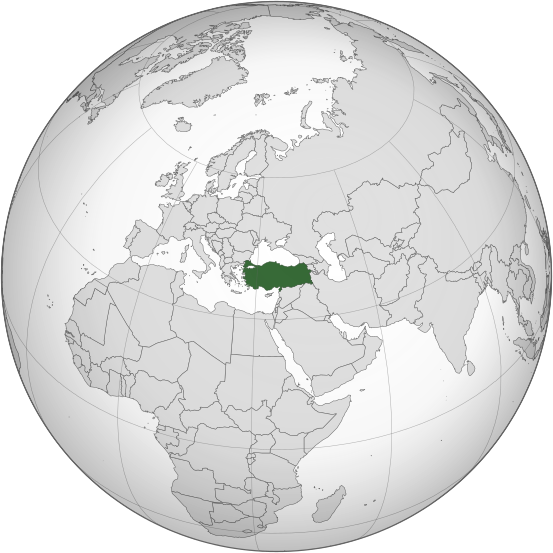

Turkey (Turkish: Türkiye [ˈtyɾcije]), officially the Republic of Turkey (Turkish: Türkiye Cumhuriyeti [ˈtyɾcije d͡ʒumˈhuɾijeti]), is a transcontinental country in Eurasia, mainly in Anatolia in Western Asia, with a smaller portion on the Balkan peninsula in South east Europe Turkey is bordered by eight countries: Greece and Bulgaria to the north west; Georgia to the north east; Armenia, the Azerbaijani exclave of Nakhchivan and Iran to the east; and Iraq and Syria to the south. The country is encircled by seas on three sides, with the Aegean Sea to the west, the Black Sea to the north, and the Mediterranean Sea to the south. The Bosphorus, the Sea of Marmara, and the Dardanelles, which together form the Turkish Straits, divide Thrace and Anatolia and separate Europe and Asia. Ankara is the capital, while Istanbul is the country’s largest city.
The area of Turkey has been inhabited since the Paleolithic age by various ancient Anatolian civilisations, as well as Assyrians, Greeks, Thracians, Phrygians, Urartians, and Armenians. After Alexander the Great conquered these lands, the area was Hellenized, a process which continued under the Roman Empire and its transition into the Byzantine Empire. The Seljuk Turks began migrating into the area in the 11th century, and their victory over the Byzantines at the Battle of Manzikert in 1071 solidified a Turkish position in Anatolia. The Seljuk Sultanate of Rûm ruled Anatolia until the Mongol invasion in 1243, when it disintegrated into small Turkish principalities.
From the end of the 13th century the Ottomans started uniting these principalities in Anatolia and then went on to create an empire that encompassed much of South east Europe, West Asia and North Africa. The Ottoman Empire became a world power beginning with the reign of Suleiman the Magnificent in the early modern period. It remained powerful and influential for two more centuries, until important setbacks in the 19th and 20th century forced it to cede strategic territories in Europe, which signalled the loss of its former military strength and wealth. After the 1913 Ottoman coup d’état, which effectively put the country under the control of the Three Pashas, the Ottoman Empire decided to join the Central Powers during World War I. Following the war, the conglomeration of territories and peoples that formerly comprised the Ottoman Empire was partitioned into several new states. Turkey itself came under partial occupation. The Turkish War of Independence, initiated by Mustafa Kemal Atatürk and his colleagues, resulted in victory over the occupying Allies, the abolition of monarchy in 1922 and the establishment of the Republic of Turkey in 1923, with Atatürk as its first president. Atatürk enacted numerous reforms, many of which incorporated various aspects of Western thought, philosophy, and customs into the new form of Turkish government.
Turkey is a charter member of the UN, an early member of NATO, the IMF and the World Bank, and a founding member of the OECD, OSCE, OIC and G-20. After becoming one of the first members of the Council of Europe in 1949, Turkey became an associate member of the EEC in 1963, joined the EU Customs Union in 1995 and started accession negotiations with the European Union in 2005. Turkey’s economy and diplomatic initiatives led to its recognition as a regional power while its location has given it geopolitical and strategic importance throughout history.
As of 2017, there are 190 universities in Turkey. Entry to higher education depends on the Student Selection and Placement System (ÖSYS). In 2008, the quota of admitted students was 600,000, compared to 1,700,000 who took the higher education exam in 2007. Entrance is regulated by the national ÖSYS examination, after which high school graduates are assigned to universities according to their performance. According to the 2018 Times Higher Education World University Rankings, the top university in Turkey is Koç University (in the 301–350 rank range), Sabancı University (in the 351–400 rank range), Bilkent University and Boğaziçi University (both in the 401–500 rank range), Atılım University, Gebze Technical University, Hacettepe University, Istanbul Technical University and Middle East Technical University (all in the 601–800 rank range), Akdeniz University, Erciyes University, Istanbul University, Izmir Institute of Technology, Marmara University, TOBB University and Yıldız Technical University (all in the 801–1000 rank range). All state and private universities are under the control of the Higher Education Board (YÖK), whose head is appointed by the President of Turkey; executive order 676 of October 2016 has created a system where in addition the President directly appoints all rectors of all state and private universities. Turkey is a member of the European Higher Education Area and actively participates in the Bologna Process.
– The Chamber of Electrical Engineers of Turkey (EMO)
– The Chamber of Computer Engineers of Turkey (BMO)

